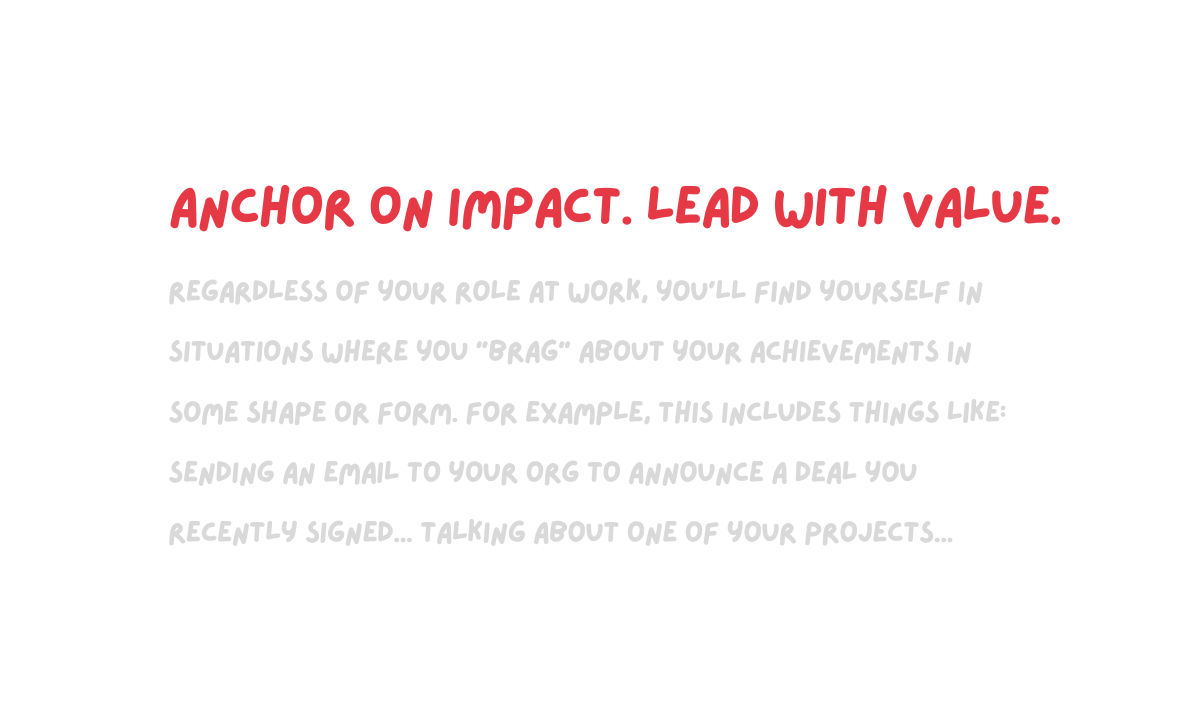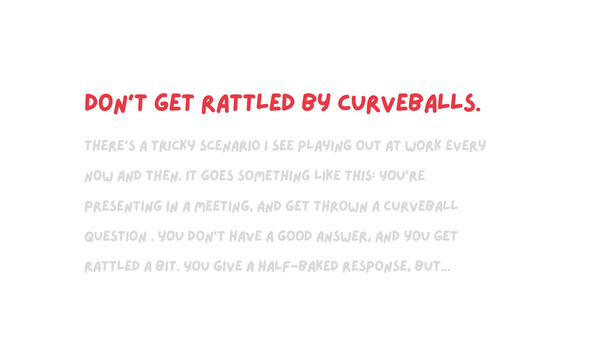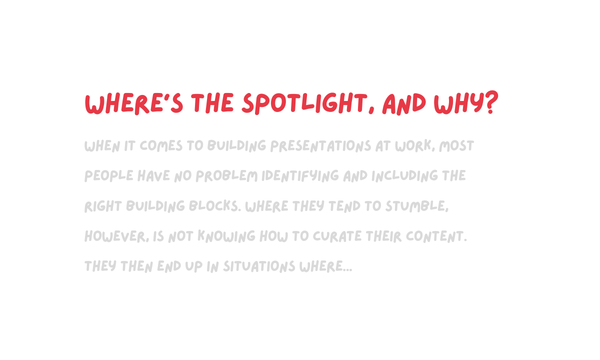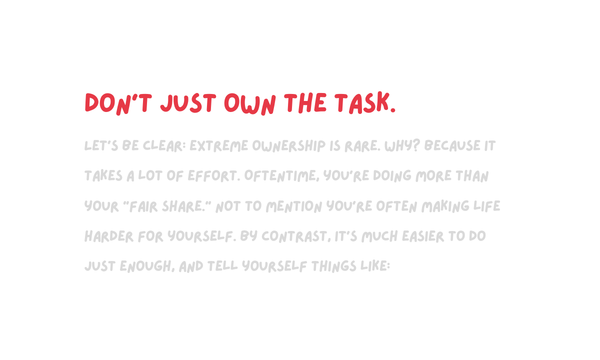How to brag at work (without being annoying)
Is bragging inherently shameless? Not if you do it right.

🔊 Note: I'm building a masterclass to help more people become exec-ready communicators and scale their influence at work! To get early access: sign up for the waitlist here (no commitment needed).
I was building a presentation at work recently. But I ran into a problem.
As part of the presentation, I was asked to write about an achievement someone else had accomplished. Except I had no idea what it was about.
So I started asking around. Luckily enough, I quickly found someone who knew. They also forwarded me an email with all the details I needed.
The good news? That email was extremely helpful. I got answers right away.
The less good news, however?
I realized that this email had been sitting in my inbox for almost a year. Yet I had no recollection of ever receiving it.
Of course, I wasn't beating myself up for simply missing an email.
Instead, what I couldn't reconcile was this:
This was a rather informative email. Yet somehow, I must have archived it into email purgatory within seconds of opening it.
What went wrong here?
👋 Join 5000+ readers and subscribe to Herng's Newsletter for free:
Bragging is only annoying if...
Regardless of your role at work, you'll find yourself in situations where you "brag" about your achievements in some shape or form.
For example, this includes things like:
- Emailing your org to announce a deal you recently signed
- Talking about one of your projects during an all-hands meeting
- Building a case study to document a successful client engagement
- Updating your leadership on what you accomplished this quarter
Even if you don't think of some of these actions as bragging – you should. Because it's literally what you're doing.
You're talking about something good that happened, and you're taking credit for it. As simple as that.
Is there any issue with this? Not at all. So why does it sound like a bad thing?
Well, that's exactly the point. It's because most people are bragging the wrong way. Which gives bragging a bad name.
It's no wonder, then, that we're conditioned into thinking that bragging is inherently annoying, self-serving, or even shameless. But this couldn't be farther from the truth.
Because what you have to realize is this:
- Bragging is good. Wins should be celebrated and socialized. It's a great way to eliminate blindspots and help people connect the dots outside of their world. Most people should do more of it – not less.
- But there's a right way and a wrong way. And you have to learn how to do it right, before doing it more.
So what was the issue with the announcement email I talked about in the beginning? I certainly didn't find it to be annoying, self-serving, or shameless.
But I dismissed it – because I deemed it to be irrelevant. Because the person behind the email was not "bragging the right way."
OK, but what does this mean exactly?
Mistake #1: Not anchoring on impact.
The biggest mistake people make when it comes to "bragging" about their achievements?
It's shining the spotlight on the wrong things.
For example, imagine that someone in your org just signed a big client, and they're planning to send out an announcement email.
Which one of the following emails makes you want to keep reading?
Email A
"I'm thrilled to announce that after 18 tough months of negotiations, we have finally signed one of our biggest clients for the finance vertical! This was truly an unimaginable outcome 18 months ago, when we couldn't even get C-level meetings due to botched deal talks from years ago. However, we managed to turn things around due to strong executive sponsorship, excellent cross-functional collaboration, and best-in-class execution."
Email B
"I'm thrilled to announce that we have finally signed Client X, who just committed to a $xxM ARR partnership, and is now one of our biggest clients in the finance vertical! We could not have gotten here without incredible support from product, legal, and engineering teams over the last 18 months. This landmark deal also gives us further confidence that we have product-market-fit in the finance vertical, and we are excited to do more this year to unlock up to $xxM in untapped opportunity."
Even though both emails are talking about the exact same deal – the difference is night and day.
Because here's what Email A is doing:
- Focusing on getting as much credit as possible, by shining the spotlight on the author's own efforts and little else.
- Somewhat acknowledging other people's efforts, but doing so rather half-heartedly and generically ("strong executive sponsorship," "excellent cross-functional collaboration").
- Subtly throwing other people under the bus, in order to further emphasize the impressiveness of their achievements ("due to botched deal talks from years ago").
Meanwhile, here's how Email B chooses to "brag:"
- It anchors on business impact for the org ("a $xxM ARR partnership"), as it is the most important common denominator for the audience.
- It chooses to be forward-looking. There is a conscious attempt to establish what this achievement means for the business in the long run ("...excited to do more this year to unlock up to $xxM..."). Another reason to get people to care.
So again: it's not that Email A is necessarily "wrong."
It just tends to get archived away quickly and forgotten.
👋 Join 5000+ readers and subscribe to Herng's Newsletter for free:
Mistake #2: Not leading with value.
Let me be clear: it's not that you have to pretend to be holier-than-thou when it comes to bragging.
(No one's forcing you to start every sentence with "I'm humbled to announce...")
Rather, it's just that you have to think more about others – and less about yourself. Preferably in that order too.
For example, the "wrong" way of bragging focuses on these types of questions:
- "What did I achieve for our business?"
- "Where did I spend most of my time and effort?"
- "What skills did I demonstrate in the process?"
- "How did I pull off something so difficult?"
- "Where did I do better than my peers?"
(Can you spot the common theme here?)
By contrast, the "right" way of bragging asks these types of questions:
- "What did I achieve for our business?"
- "What can others learn from this deal?"
- "What insights can I share with others?"
- "How can this help others run faster?"
- "How do I help others steal with pride?"
In other words: Make sure you always lead with value whenever you "brag" about your work.
Focus less on what you achieved, and focus more on the learnings you uncovered in the process of achieving what you achieved.
Small mindset shift – but big difference.
In fact, one of the best ways to deliver value, which might sound counterintuitive?
It's to talk about your mistakes. It's to talk about where you stumbled. It's to talk about what you would've done differently.
Because when you do this:
- You ensure attention. Let's face it: no one really wants to read another story about someone patting themselves on the back. But as soon as you flip things around? Curiosity takes over.
- You ensure authenticity. Because again, unless you possess finesse, it's hard to brag about your work in a non-cliche manner. But this problem goes away as soon as you show genuine vulnerability.
- You actually help people. Loss aversion is a powerful framing. Not everybody will care about learning how to replicate your success. But most people will want to know how to avoid making the same mistakes you made.
- You don't look bad at all. It's easy to recount all the wonderful things one did right. By contrast, it takes a much higher level of self-awareness to identify what one could've done better. Don't underestimate how refreshing and insightful this can be.
So remember: it's OK to brag. But anchor on impact (to the business). And lead with value (for others).
🔊 Reminder: if you found this useful, you might also enjoy the masterclass I'm building! Learn how to influence execs and punch above your weight at work. To enjoy early access: sign up for the waitlist here (no commitment needed).
🧠 Thanks for reading Herng's Newsletter this week! If this was forwarded to you, join 5000+ readers and subscribe for free here.


